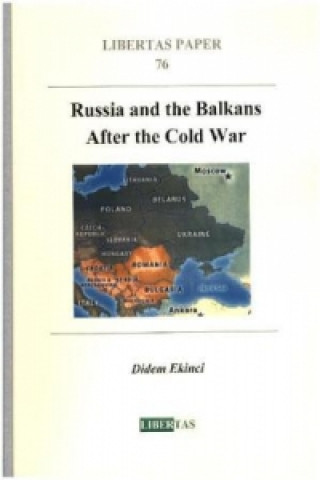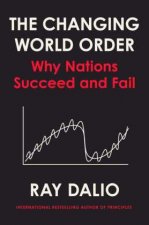
Kod: 02822672
Russia and the Balkans After the Cold War
Autor Didem Ekinci
The Publication§This book focuses on the post-Cold War evolution of Russia's Balkan policies, upon a brief historical background. Shaped by liberal, nationalist/Communist and pragmatist approaches in domestic and foreign policy-ma ... więcej
- Język:
 Angielski
Angielski - Oprawa: Miękka
- Liczba stron: 110
Wydawca: LIBERTAS-Europäisches Institut, 2015
- Więcej informacji o książce

Powiadomienie o dostępności
Wpisz swój adres e-mail, aby otrzymać od nas powiadomienie,
gdy książka będzie dostępna. Proste, prawda?
Więcej informacji o Russia and the Balkans After the Cold War
 Opis
Opis
The Publication§This book focuses on the post-Cold War evolution of Russia's Balkan policies, upon a brief historical background. Shaped by liberal, nationalist/Communist and pragmatist approaches in domestic and foreign policy-making, Russia's overall Balkan policy was marked by emphasis on its great power status, emphasis on the centrality of the UN in international relations, opposition to NATO expansion and stressing the importance of multipolarity, in the context of which can be argued that these were upheld and viewed as more important by the Russian decision-makers than the Russian public who were more concerned with pressing social conditions in the 1990s. Broadly speaking, Russia's Balkan policy has displayed continuity as evidenced by the embrace of the above-mentioned accustomed approaches to the region, their roots dating back to either in the Tsarist or the Communist times. Although diplomacy and political solutions have been at the center, military means were not excluded when times of conflict stipulated.§For the future it can be maintained that there is every reason to expect the continuation of the Russian-Serbian alliance, be it for traditional (sentiment of historical affinity) or pragmatic (e.g. energy cooperation) reasons. On the EU front, the bilateral relationship should not be expected to be prejudiced even if Serbia becomes a full member of the EU when the day comes, because the components of the established relationship seem to persist. In the worst case, even if relations get persevered due to the consequences of Serbia's prospective EU membership, it will possibly not endure too long.§Second, Russia's Kosovo approach can be expected to be in conformity with Serbia's relevant discourse as it currently is. In fact, the Kosovo issue still stands as the most critical dividing problem not just between the regional actors but also between Russia and the West. Even though recent times have shown some dialogue atmosphere between the former conflicting parties, any meaningful results are too early to guess. The most unexpected development on this score would be Serbia's recognition of Kosovo one day, while Russian approach remains unchanged.§Third, Russia is likely to employ every means possible to exert its influence in the field of energy in the region. This is likely to be the case with or without the development of rival energy projects by the West, for basically two reasons: the region is energy-poor which makes it a target geography in this respect for Russia, and with its broad and established energy strategy, Russia has been no stranger in the region. Nevertheless, the ways that Russia might be expected to draw its red lines in the field of energy development in the region in face of the EU's policies of energy integration so far remain quite contested. More bluntly, how Russia and the EU are going to play their cards are yet to be seen. Fourth, although an all-time actor in the Balkans, Russia has not made any attempt, for instance, to establish a regional platform after 1990 (as it had done in the past), in which it would also participate. Its choice in that respect has been the CIS. Hypothetically thinking, such an attempt, especially at a time when the thorniest Kosovo issue seems to have relatively subsided, would possibly lead to an unnecessary chilling of relations with the West, not to mention the levels of unwillingness of the regional states.§Finally, it can be estimated that Russia's Balkan policy is likely to remain as it is, unless changing circumstances emerge in the Balkans. The absence of any so-called frozen territorial conflicts in the region in which Russia would be implicated (unlike the case in the Caucasus) makes the prospects of an excessive Russian assertion improbable.§In the final analysis, Russia is likely to matter for the Balkans as it had done in the past, with the assumed red lines conditioning its patterns of behavior towards the region. Given that the West is no
 Szczegóły książki
Szczegóły książki
Kategoria Książki po angielsku Economics, finance, business & management Economics
- Pełny tytuł: Russia and the Balkans After the Cold War
- Autor: Didem Ekinci
- Język:
 Angielski
Angielski - Oprawa: Miękka
- Liczba stron: 110
- EAN: 9783937642406
- ID: 02822672
- Wydawca: LIBERTAS-Europäisches Institut
- Waga: 608 g
- Wymiary: 297 × 211 × 14 mm
- Data wydania: 28. October 2015
Ulubione w innej kategorii
-

Principles for Dealing with the Changing World Order
92.85 zł -15 % -

Team Topologies
92.85 zł -23 % -

Freakonomics
36.43 zł -14 % -

Misbehaving - The Making of Behavioral Economics
48.38 zł -5 % -

Indispensable Milton Friedman
118.35 zł -11 % -

Little Book of Economics
47.18 zł -23 % -

Why Nations Fail
37.64 zł -26 % -

Pyramid Principle, The
189.03 zł -4 % -

Essential Mathematics for Economic Analysis
314.82 zł -7 % -

Economics In One Lesson
70.16 zł -23 % -

Predictably Irrational
68.06 zł -15 % -

Price of Inequality
48.38 zł -5 % -

(Mis)Behaviour of Markets
60.93 zł -23 % -

Debt, 10th Anniversary Edition
120.26 zł -23 % -

A-Level Economics: Year 1 & 2 Complete Revision & Practice (with Online Edition)
119.56 zł -10 % -

The Invisible Hand
33.52 zł -23 % -

Liar's Poker
60.73 zł -

Rational Optimist
52.50 zł -22 % -

Irrational Exuberance
96.47 zł -6 % -

Art of Statistics
52.20 zł -15 % -

Scrum - A Pocket Guide - 3rd edition
96.17 zł -5 % -

Hypomanic Edge
101.49 zł -

How I Made One Million Dollars Last Year Trading Commodities
204.99 zł -4 % -

Misbehavior of Markets
116.85 zł -

Econometric Analysis, Global Edition
390.92 zł -

Cartoon Introduction to Economics
88.74 zł -11 % -

Economics: The User's Guide
61.03 zł -15 % -

Rise of Carry: The Dangerous Consequences of Volatility Suppression and the New Financial Order of Decaying Growth and Recurring Crisis
115.84 zł -23 % -

Myth of Capitalism - Monopolies and the Death of Competition
118.35 zł -11 % -

How Rich Countries Got Rich and Why Poor Countries Stay Poor
70.16 zł -23 % -

Business Etiquette in Brief
63.14 zł -4 % -

Intermediate Microeconomics and Its Application
447.54 zł -

Discovery, Capitalism & Distributive Justice
94.46 zł -

Economic Point of View
123.47 zł -

Are the Rich Necessary?
61.43 zł -6 % -

Driving Digital Transformation
92.85 zł -23 % -

Start-Up Nation
43.26 zł -15 % -

Economic Facts and Fallacies
85.32 zł -5 % -

Decision Book
84.72 zł -6 % -

Necessary but Not Sufficient
85.22 zł -4 % -

Freakonomics
28.90 zł -23 % -

Economics Book
91.05 zł -14 % -

Leading at a Higher Level
129.80 zł -5 % -

Principles of Economics
76.29 zł -1 % -

Macroeconomics For Dummies
107.31 zł -11 % -

45 Second Presentation That Will Change Your Life
49.48 zł -4 % -

Economics of the Public Sector
311.41 zł -5 % -

Factfulness
51.99 zł -10 % -

Currency Wars
69.96 zł -14 %
zadowolonych klientów
Od roku 2008 obsłużyliśmy wielu miłośników książek, ale dla nas każdy był tym wyjątkowym.
Copyright! ©2008-24 libristo.pl Wszelkie prawa zastrzeżonePrywatnieCookies



 21 milionów książek
21 milionów książek Dostawa 10.99 zł
Dostawa 10.99 zł (32) 444 93 66 (8-15.30h)
(32) 444 93 66 (8-15.30h)